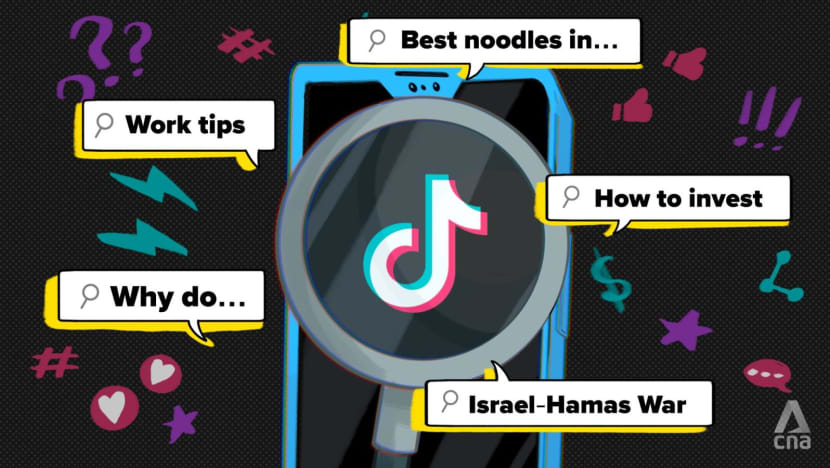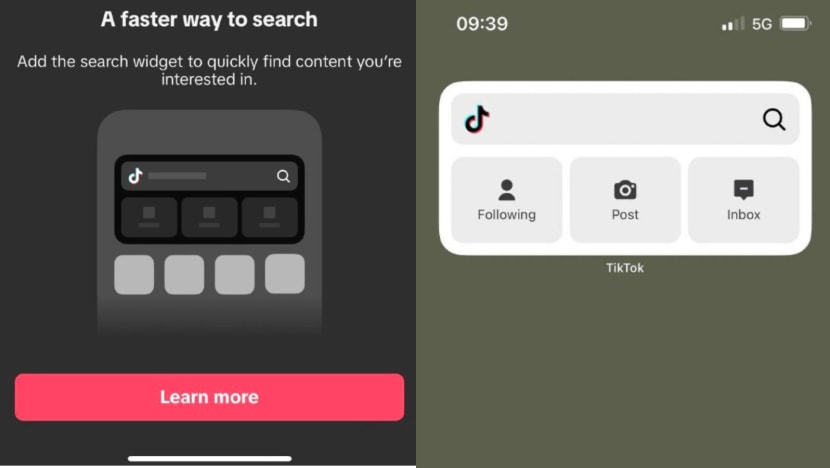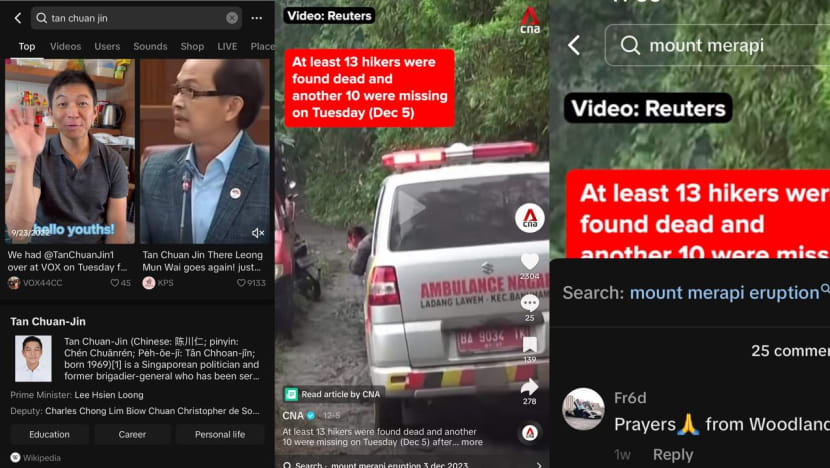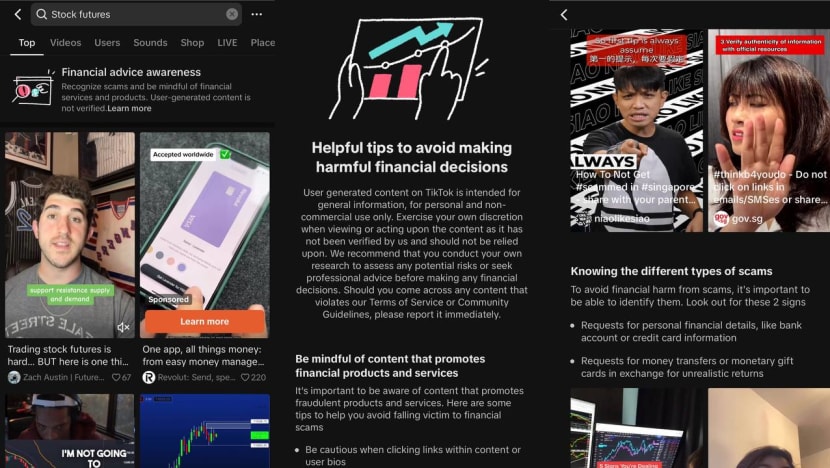Is TikTok the new Google? Some Gen Zs think it's even better

(Illustration: CNA/Clara Ho)

This audio is generated by an AI tool.
SINGAPORE: When aspiring concert photographer Celestina Gimino wanted advice on breaking into the industry, she looked to TikTok for help.
Networking and photography tips from the app helped the 21-year-old successfully land several jobs, including one to photograph singer-songwriter Boy Pablo for his concert in Singapore before the gig was cancelled.
Ms Gimino isn’t the only one going to TikTok for answers despite concerns in some quarters over the reliability of information on the platform.
Gen Zs - those born roughly between the late 1990s and the early 2010s - are now using the social media platform for more than just entertainment.
“We’re seeing a significant shift with many Gen Z users favouring TikTok over Google for their searches,” said Singapore Polytechnic’s digital marketing and analytics lecturer Jonathan Lok.
“This trend reflects the evolving digital environment and their distinct preferences,” he added.

For Google, whose name has become a byword for internet search, this is clearly a concern.
“In our studies, something like almost 40 per cent of young people, when they’re looking for a place for lunch, they don’t go to Google Maps or Search,” Mr Prabhakar Raghavan, a Google senior vice president, said at a conference in 2022.
“They go to TikTok or Instagram.”
“IT’S JUST EASIER”
It started with food-related searches, said Ms Gimino, who first used TikTok in 2020 to stay connected with friends and pass the time during the COVID-19 pandemic.
Soon after, her searches quickly progressed to subjects like physical health, mental illness and daily news. By late 2020, TikTok was the first port of call anytime Ms Gimino needed a question answered.
“It’s just easier to be on TikTok,” said Ms Gimino, who praised the app’s user-friendly interface and sense of community.

Professor Tracy Loh, senior lecturer of communication management at Singapore Management University (SMU), said TikTok is the app of choice for Gen Zs.
An annual digital news report by the Reuters Institute revealed that TikTok grew in popularity in Singapore this year, reaching 49 per cent of Singaporeans aged 18 to 24.
All their friends are there and TikTok is almost synonymous with the word social media, said Prof Loh, adding that it is natural for youths to use its search function.
Another feature that draws youths to the app is the active comments section.
This means going to TikTok is like “hearing advice from people and their actual experiences”, says 19-year-old Nasyitha Zamree.
Similarly, Ms Gimino wants to know what others think when she looks something up. “On TikTok, I can just scroll to see other people’s comments," she said. “But for Google, I have to click into individual links and back again.”
To make the search process even more seamless, TikTok updated its app in May, allowing users to add a search bar as a widget to a phone's home screen.
In other words, search for something on TikTok without first opening TikTok itself.

To bring information directly to users, TikTok spokesperson Zachary Kizer confirmed in an interview with The Verge that the company is partnering Wikipedia.
Some search results include Wikipedia snippets between relevant videos. If users want to know more about a topic, clicking the snippet brings them directly to the relevant Wikipedia page.
When trying this out, CNA found that the Wikipedia excerpts are sporadic and do not appear for every search. Mr Kizer did not specify how the app determines which search results receive a linked Wikipedia snippet.
A common feature frequently used on TikTok is the hyperlinked keywords tagged to a video.
Rachel Sim, 21, said she recently started using TikTok to analyse investment trends and to learn more about the subject.
“If there’s a term I don’t understand, even in the comment section, I can click on it and it brings me to another video that explains it,” she said. The feature makes information easier to attain and understand, she added.

LENGTHY ARTICLES OUT, SHORT VIDEOS IN
TikTok's appeal also lies in its fast-paced platform - perfect for the younger set.
“A growing number of Gen Zs have shorter attention spans,” said Associate Professor Brian Lee, head of Singapore University of Social Sciences’ (SUSS) communication programme. “Many avoid going through lengthy and wordy write-ups. Short videos appeal to them instead.”
Likewise, Prof Loh told CNA that the visual nature of TikTok makes content “very easily consumable and digestible”.
“Pictures are so much easier to comprehend. It takes less cognitive time and energy,” she said.
Compared to apps like Facebook, which tend to be more text-heavy, and long-form platforms like YouTube, TikTok's focus on short videos stands out.
Ms Sim, the 21-year-old, also said that unlike YouTube and Google, the content on TikTok feels more up-to-date as “people are constantly posting”.
“Google doesn't give me exactly what I want,” she added.
While the shift is not inherently negative, it represents a change in how information is consumed and valued, said Mr Lok of Singapore Polytechnic.
USING TIKTOK FOR NEWS
This year's Reuters digital news report also found that more people are turning to TikTok as a news source in 2023.
“In almost every case, we found that younger users are less likely to go directly to a news site or app and more likely to use social media or other intermediaries,” according to the Reuters Institute.
Twelve per cent of Singaporeans get their news from TikTok, up five percentage points from last year, the biggest increase among the most-used platforms in the country, according to the study. Among 18 to 24-year-olds, the numbers spike to 22 per cent.
In the region, a quarter of Malaysians and 22 per cent of Indonesians use TikTok as a news source, up nine and six percentage points from a year ago.
“It’s okay for them to use TikTok. It’s better that they get the news there than from nowhere at all,” said SMU's Prof Loh.
Indeed, the app was where Ms Gimino first heard about former Speaker of the House Tan Chuan-Jin’s use of “unparliamentary language" and his extramarital affair with former People's Action Party MP Cheng Li Hui.
“It is useful in letting the younger generation find out about what’s happening currently in the local and international political scene,” said Ms Nasyitha, an undergraduate at Nanyang Technological University.
“Without TikTok or even Instagram, many youths really wouldn’t know that all of this is happening around the world.”
Ms Danielle Fuentes, who has dyslexia, relies heavily on the app to find out what is happening in Singapore and around the world. “Reading takes me a long time and … is not my strength,” said the 21-year-old, adding that platforms like TikTok are extremely useful when articles present challenges for her.
“TikTok makes it easier for me to retain information.”
HOW RELIABLE IS TIKTOK?
Last month, a CNA experiment tracking content on the Israel-Hamas war identified a steady stream of inaccurate content spreading on the platform.
In response to criticisms by US lawmakers arguing that the platform favoured pro-Palestinian content, TikTok said on Nov 13 that it has “rigorous measures in place to prevent manipulation”.
It said more than 925,000 videos were removed between Oct 7 and Oct 31 for violating its policies around violence, hate speech, misinformation and terrorism.
Given the scrutiny on TikTok over misinformation, is it a problem that Gen Zs use it as a search engine?
“While TikTok excels in providing engaging content, its focus on user interaction can lead to challenges in ensuring factual accuracy, which is a significant concern in the era of misinformation,” said Mr Lok.
He acknowledged that SEO - search engine optimisation - can influence results on Google, which in turn affects the relevance and accuracy of the information provided.
Every platform has its unique strengths of reliability, added Mr Lok, emphasising that it is essential to understand that both Google and TikTok take different approaches to presenting information.
“For now, TikTok cannot compare to other traditional search engines, such as Google, in terms of reliability and professional standards,” said Assoc Prof Lee of SUSS.
TikTok's algorithm prioritises the people you follow or how the app has been used. This, Prof Loh said, means that the app might not present a user with the array of information needed. She also pointed to Google’s “much bigger” database against TikTok’s smaller set of information.
“There is always a danger of going down the rabbit hole of misinformation, getting yourself into an echo chamber,” added Prof Loh. “There are no checks on the veracity of the information you are consuming.”
However, the Gen Zs that look to TikTok first for answers do not necessarily trust its findings implicitly.
“If I’m searching for something more serious, I definitely go on TikTok and then check on Google,” said Ms Gimino.
It is “imperative” for users to verify the credentials of a source on TikTok when making serious decisions, especially those related to health or finance, warned Prof Loh.
On its part, TikTok provides disclaimers and advises viewer discretion on certain subjects. For example, when one looks up "financial advice", the first result is a pop-up reminding users to be wary of scams.
"We recommend that you conduct your own research to assess any potential advice before making any financial decisions," the advisory reads.

Users need to be cautious and remember that TikTok's algorithm prioritises engagement, which may not always align with factual accuracy, advised Mr Lok.
“Utilising tools like Google's ‘Fact Check Explorer’ can help verify the information found on TikTok.”
Prof Loh and Ms Fuentes both agreed that the social media platform is a good place for brief explanations of a subject as opposed to a source for comprehensive answers.
TikTok should be used as a starting point for getting information and Google to better understand the subject, said Ms Fuentes. Users seeking "in-depth and nuanced" information should look elsewhere, said Prof Loh, as "there’s only so much information you can convey in that short span of time".
TIKTOK'S FUTURE
Whether TikTok can usurp Google’s throne as a search tool remains to be seen. “There’s still a lot of everybody else out there,” said Prof Loh.
While Assoc Prof Lee believes the platform’s popularity as a search engine for pop culture and news trends will grow, reliability for work and professional information “will still be questionable”.
However, what sets TikTok apart from traditional search engines is its "unique approach to information delivery, particularly in understanding specific topics", said sets it apart from traditional search engines,” said Mr Lok of Singapore Polytechnic.
He said the app has the potential to appeal to all age groups but also acknowledged that an innate preference for familiarity means that the “transition from traditional search methods to newer ones often faces resistance”.
Still, users from other age groups will likely increase drastically, according to Assoc Prof Lee.
“It won't become the top search engine for everyone. But no doubt it will become the least boring platform for netizens to get information.”



















